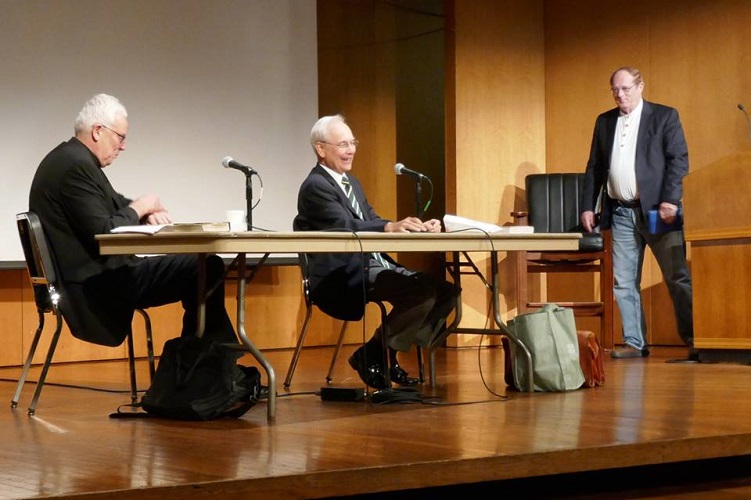Today’s convocation hour was a collegial debate between our current Greek teacher, Dr. John G. Nordling, and a former professor of ours, Dr. James W. Voelz, who has been teaching at our sister Seminary in St. Louis since 1989. Their debate? “How should Greek be taught to seminarians in the twenty-first century, and why does philological competence remain vital for the church?”

These two are experts in the field. Dr. Nordling has taught Greek at CTSFW for the past twelve years (not to mention at Valparaiso and Baylor for many years before then), and Dr. Voelz, who has taught Greek for over 40 years, wrote “Fundamental Greek Grammar,” the textbook used at both seminaries.
I have to admit: this convocation lost me in the details (it was, as they say, all Greek to me). What I did understand was that both professors hold distinctly different views on the first half of the topic: how Greek should be taught to seminarians. Dr. Nordling’s methodology is very technical, shaped by his desire to lay the building blocks of Greek grammar, terms, word order, and tense usage in order to move seminarians along in their understanding of the language. You teach Greek, then through this stronger understanding of Greek are able to teach theology at a higher level. He also argued that composition, though time-consuming, is the best way to keep seminarians from learning Greek passively. “For,” as he pointed out to his grinning students, “they can be counted on to make many bone-headed mistakes.”
Dr. Voelz accused Dr. Nordling – with good humor – of not having enough romance in his soul. Dr. Voelz’s number one goal when teaching a class is to instill a sense of excitement in his students for the original text, which they can someday pass on to their congregations. As such, his methodology is less technical, jumping more quickly into the deeper dimensions of the text so that a seminarian can quickly begin to open up the language of the New Testament like a flower, even if his understanding of the rules commanding Greek isn’t yet set. Dr. Voelz wants the newly ordained pastor out in the field to regret giving up Greek (“giving up real contact with the Word of God,” as he put it), rather than giving it up out of relief.
Though they disagreed fundamentally on teaching method, they agreed absolutely in purpose – or “why philological competence (strong linguistic skills in the Bible’s original languages) remains vital.” Dr. Weinrich, who was mediating, concluded perfectly: that both men clearly love Greek, and just as clearly love Greek for its purpose — to put seminarians (and our future pastors) into direct contact with God’s Word.
Seminarian Austin Meier made an audio recording of the debate. You can listen to it here: https://drive.google.com/file/d/1rSvd3ElicQLIXjDXz-fXDwyjJVPNMXFy/
